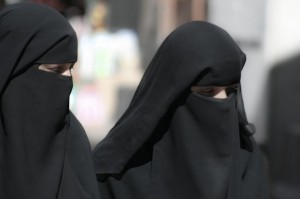Rules Are for Schmucks: “I’m from the Government, and I’m Here to Help”
 Photo by michelealfieri / 123RF
Photo by michelealfieri / 123RF My title is a well-known prevarication, along with “the check is in the mail” and “of course I’ll respect you in the morning.”
In March, the U.S. Equal Employment Opportunity Commission decided to provide the employers of America with some help they hadn’t really asked for in the form of “guidance” concerning workplace rules on religious grooming and dress. Guidance, as in “Ignore this decree and we’ll bankrupt you in a heartbeat.”
Many of the examples provided in the guidance are based on actual decided cases, and were not just dreamed up by EEOC staff. What matters isn’t who’s responsible, but the substance of what the rules provide.
One of the examples involves a salesperson at a trendy upscale fashion store. The company requires all its sales personnel, without exception, to wear trendy upscale fashion garments on the job, preferably of a brand sold in the store because a tremendous body of experience and data proves this will yield higher sales. The salesperson, a woman, converts to Islam and starts showing up for work wearing a full burqa—one of those tent-like body coverings with a narrow slit for the eyes. Think she’s going to sell a lot of form-fitting evening gowns wearing that? “Oh, you look ravishing in the blue …”
What can her manager do about this, once sales start to plummet? Nothing.
Can the store comply with the law by moving her to a different assignment, at the same or higher pay, in a clerical or other position where her job doesn’t require making a favorable impression on customers? Of course not—that would make too much sense.
Then there’s “Edward,” the name given to the employee in the EEOC’s Example No. 9. Edward decides to start practicing the “Kemetic” religion, worshiping the Egyptian sun god Ra. Don’t be embarrassed if you haven’t heard of the Kemetic religion, because its total membership numbers fewer than ten. One of the reasons why Kemetism is so small is that it requires covering the wrists with tattoos of bizarre Coptic symbols. Edward’s employer is cool with that, suggesting only that Edward wear a long-sleeved shirt. Fiend! Lawbreaker! Edward can’t be forced to deny Ra in that manner, not under this religion-dominated government.
The God industry, here as elsewhere, gets vastly more deferential treatment than everyone else. If an employee wants to wear something supporting a sports team, a politician, baby seals, or even our troops, an employer is free to say, “This just isn’t the place for your personal opinions. Wear something neutral instead.” Say the same thing about tattoos for Ra, though, and the whole weight of the U.S government will come crashing down on you.
Although the title of the document implies that it is limited to employees’ garb and grooming, the slick lawyers who drafted it were careful to slip in “proselytizing” as another protected religious practice in the workplace. So if you run a struggling McDonald’s franchise across the street from a Burger King, and one of your employees takes it upon himself to tell every customer, “Here’s your change, and I do hope you’ll join us at worship next Sunday so you don’t burn in hell,” there’s nothing you can (legally) do about it. As EEOC sternly warns, “Customer preference about religious beliefs and practices is not a lawful basis for employment decisions.”
Wouldn’t it be nice to be able to run a business in which religion plays no role? In which employees can believe or do anything they want on their own time, but while they’re being paid they must focus their sole attention on getting their jobs done as efficiently as possible? Maybe that kind of world was what John Lennon’s song Imagine was all about.
